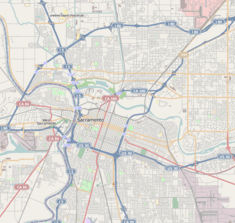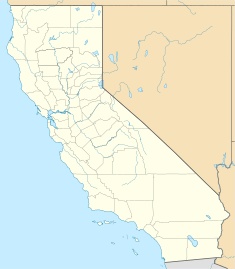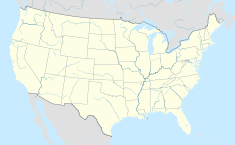Senator Hotel facts for kids
Quick facts for kids |
|
|
Hotel Senator
|
|
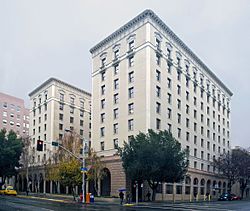 |
|
| Location | 1121 L Street, Sacramento, California |
|---|---|
| Area | .87 acres (0.35 ha) |
| Built | 1923–1924 |
| Architect | Kenneth MacDonald and G. Albert Lansburgh |
| Architectural style | Renaissance Revival architecture |
| NRHP reference No. | 79003459 |
| Added to NRHP | May 30, 1979 |
The Senator Hotel was a famous building in Sacramento, California. It stood nine stories tall and had 400 rooms. This hotel was built in an Italian Renaissance style. It was located right across from the California State Capitol building.
From 1924 to 1979, the Senator Hotel was a very important place. It was a hub for California's political and social life. Many important people stayed or met there. For example, President Gerald Ford spent a night there in 1975. The hotel was added to the National Register of Historic Places in May 1979. However, it closed just two months later. In 1983, the building was renovated. It reopened as an office building, still called the Senator Hotel Office Building. This allowed people who work with politicians (called lobbyists) to be very close to the state government.
Contents
Exploring the Hotel's Design
The Senator Hotel building has two main parts. These parts are made of strong concrete. Each section is nine stories high. A lobby building connects these two main parts.
Italian-Inspired Architecture
The hotel's style was inspired by the Palazzo Farnese in Florence, Italy. The front of the building, facing L Street, is about 165 feet long. It features a beautiful row of arches along the front and sides. When the hotel first opened in 1924, these arches were covered in a peach-colored material. This material looked like large, smooth marble blocks. The front area was open, like a porch, for guests. Later, this space was enclosed with glass.
Inside the Grand Lobby
The hotel's lobby was designed to look like a 16th-century Italian courtyard. Guests entered from L Street through special hand-painted doors. The lobby had rough plastered walls decorated with gold and blue colors. A large skylight let in natural light. Guests could walk across the lobby to two winding staircases. These stairs led to a balcony that overlooked the lobby. The railings of the staircases had fancy ironwork designs.
Dining and Entertainment Spaces
The Senator Hotel offered more than just rooms. It had restaurants and meeting rooms for everyone. When it opened, a band called The Syncopating Senators played there. The hotel even had its own orchestra.
One famous area was the Empire Room. It had a long bar designed by architect G. Albert Lansburgh. Another room was the Peacock Room, which was a special tea room for women. The Florentine Dining Room was the hotel's main dining area. It was designed to look like a room in the Palazzo Farnese. There was also the Roman Banquet Hall, used for large dinners and events. Many of these rooms were updated in 1954.
As of 2012, the building had about 147,000 square feet of space. A cool feature was that offices in the building could listen in on government meetings. They used a special speaker system, like a "squawk box," to hear what was happening in the Assembly or Senate.
A Look Back at History
The Senator Hotel opened in the 1920s, a busy time for Sacramento. The city adopted a new government system in 1920. In 1923, the Sacramento Municipal Utility District (SMUD) was created to provide electricity. The year 1924 brought many changes. A law school opened, a department store started, and Sacramento got filtered drinking water.
Building a Landmark Hotel
The Senator Hotel cost $2 million to build in 1923–1924. It was designed by Kenneth MacDonald and G. Albert Lansburgh. It opened in August 1924. The hotel's main goal was to offer rooms and meeting spaces for California's politicians and business people. The Senator Hotel became part of a new and popular shopping area in Sacramento.
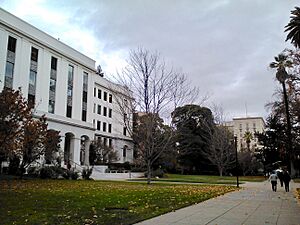
Famous Guests and Political Hub
Many famous people visited the Senator Hotel. Silent film star Buster Keaton stayed there in 1927 while making a movie. A few months later, pilot Charles Lindbergh was honored there for his historic flight across the Atlantic.
From the 1930s to the 1950s, the hotel was the center of political life. Politicians and lobbyists would meet in the lobby. They discussed important government matters. Boxer Max Baer, a world champion, often visited the hotel. Arthur Samish, a very powerful lobbyist, had a fancy suite there.
Other notable guests included Martin Luther King Jr.. Writer Joan Didion once auditioned for a play at the hotel. Famous author William Saroyan also spent time at the hotel bar. In the late 1950s, Stan Kenton and his jazz orchestra performed in the Empire Room. Many governors and presidents stayed at the hotel. These included Governors Jerry Brown and Ronald Reagan, and Presidents Richard Nixon and Jimmy Carter. President Gerald Ford stayed there before an attempt to harm him in 1975.
Changes and New Beginnings
In early 1979, baseball legend Mickey Mantle attended a convention at the hotel. In May 1979, the Senator Hotel was added to the National Register of Historic Places. This was partly because of its unique Italian Renaissance design. However, in July, the hotel had to close. It had many fire safety and building code problems. Sacramento was left without a major historic hotel.
A developer named Marvin "Buzz" Oates bought the hotel in November 1979. He spent $15 million to renovate it. In 1983, the building reopened as an office building. It was renamed the "Senator Hotel Office Building." This made it easy for lobbyists to reach state politicians. In 1987, the building was sold for $30 million. Due to economic challenges, the building's occupancy dropped. The owners lost the property in 2012. The hotel was then listed for sale again. Today, it continues to serve as an office building.
Other Historic Hotels in Sacramento
- Citizen Hotel
- Hotel Sacramento (1909–1956)
- Travelers' Hotel (1914–1982)
 | Bessie Coleman |
 | Spann Watson |
 | Jill E. Brown |
 | Sherman W. White |


